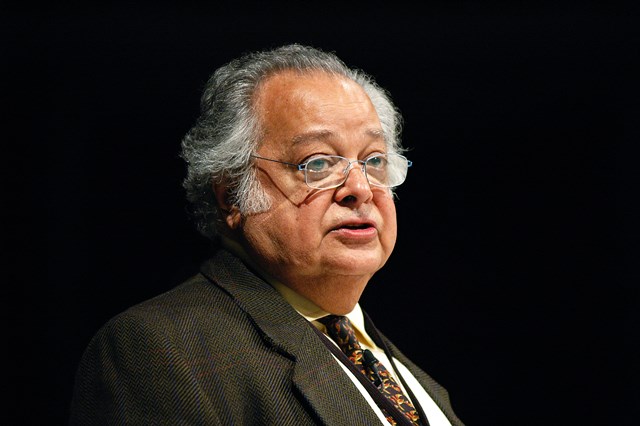 Sir Shridath "Sonny" Ramphal. [photo: Liam Bailey/ Alamy]
Sir Shridath "Sonny" Ramphal. [photo: Liam Bailey/ Alamy]
[This is an excerpt from an article in The Round Table: The Commonwealth Journal of International Affairs.]
Shridath ‘Sonny’ Ramphal’s destiny was foretold. In 1929, before his first birthday, the Reverend C.F. Andrews, a close confidante of Mahatma Gandhi, lifted the infant Ramphal during a visit to British Guiana and declared, ‘This child will have a long and rewarding life’.
Sir Shridath fulfilled that prophecy. Born on 3 October 1928, in colonial British Guiana, he rose from modest beginnings to leave an indelible mark on the world stage, championing justice, unity, and equality.
In 1952, Sir Shridath became the first West Indian to earn a Master of Laws with distinction from King’s College, London. His thesis on West Indian Federation, written six years before its formation, led to his recruitment to the cause. He worked for the Federation until its collapse in 1962, sparking his lifelong commitment to regional integration. Undeterred by the Federation’s end, Ramphal drafted the Caribbean Free Trade Agreement in 1965, laying the groundwork for CARICOM’s creation by treaty in 1973.
The African, Caribbean, and Pacific (ACP) group grew out of an initiative Sonny took in 1972 at a Non-Aligned foreign ministers’ meeting chaired by him in Guyana. He believed that unity among the three regions would strengthen their negotiations with the European Union. The resulting convention was the first where developing countries negotiated their own terms, with Sonny playing a leading role.
When he assumed leadership of the Commonwealth in 1975, the association was evolving into a coalition of equal nations. Under his stewardship, the Commonwealth became a force for justice, addressing global challenges like environmental degradation, disarmament, and the widening gap between rich and poor nations.
The Round Table remembers Sir Shridath Ramphal
One of his greatest triumphs was his role in dismantling apartheid in South Africa and securing Nelson Mandela’s release in 1990. Through diplomacy and persistence, Ramphal united Commonwealth leaders to pressure the apartheid regime, despite opposition from British Prime Minister Margaret Thatcher. Two months after his release, Mandela visited Ramphal’s home in London instead of 10 Downing Street, marking their bond. ‘He is one of those men who have become famous because, in their fight for human justice, they have chosen the whole world as their theatre,’ Mandela said.
Ramphal’s work against racism extended beyond South Africa. He played a key role in securing Zimbabwe’s independence, helping enshrine ‘one man, one vote’ and ending white minority rule in Southern Rhodesia. These accomplishments reflected his lifelong dedication to justice, unity, and self-determination.
But they also earned him enemies, including the former British Foreign Secretary Lord Carrington, who swore he would swim the Atlantic twice to stop Ramphal from becoming UN Secretary-General in 1981.
While disappointed at not securing the UN post, Ramphal intensified his work through the Commonwealth. He launched initiatives on environmental degradation, disarmament, and the widening rich-poor divide. His creation of Commonwealth Expert Groups brought attention to the challenges of developing states, including the debt crisis and climate change. His approach was always grounded in the interconnectedness of the Commonwealth and the world.
He believed in meticulous preparation for every event and statement. Words mattered to him, and he used them with precision, often finding compromise in seemingly unbridgeable divides. His orchestration of Commonwealth Heads of Government Meetings – especially the ‘heads-only’ retreats – allowed leaders to engage meaningfully on key issues, building empathy away from official communiqués. This approach gave these meetings purpose and kept both media and the public engaged.
Even in his 90s, Sonny remained active, demonstrating his commitment to justice. At the age of 92, during the COVID-19 pandemic, he made history as the first lawyer to appear virtually before the International Court of Justice, presenting Guyana’s arguments in its territorial dispute with Venezuela over two-thirds of Guyana’s land.
Sir Ronald Sanders is Ambassador of Antigua and Barbuda to the United States of America and to the Organisation of American States, Washington.



